|
|
|
Sort Order |
|
|
|
Items / Page
|
|
|
|
|
|
|
| Srl | Item |
| 1 |
ID:
197048


|
|
|
|
|
| Summary/Abstract |
The study examines the impact of Covid-19-induced economic stressors (such as incomes and job losses) on household alcohol consumption in India. Our analysis, based on eight waves of the Centre for Monitoring Indian Economy–Consumer Pyramids Household Survey (CMIE-CPHS) for the period January 2019–August 2021, confirms an increased consumption of alcohol during the pandemic despite supply restrictions imposed by the state. A spurt was witnessed across socioeconomic groups with varying intensities. This confirms the self-medication hypothesis and stress-response-dampening theory that households responded to the pandemic-related economic and psychological shocks by increasing the consumption of alcohol and is more significant for the poor and the marginalised.
|
|
|
|
|
|
|
|
|
|
|
|
|
|
|
|
| 2 |
ID:
183760
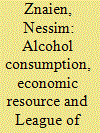

|
|
|
|
|
| Summary/Abstract |
Syria and Lebanon were declared French mandates by the League of Nations just after the First World War at the climax of a global prohibition, especially in the United States. Contrary to North Africa, Levant was already a great land of wine and arak production, especially through religious congregations. In that context, especially during the 1930s crisis, the French authorities were asked to protect and sustain the Lebanese vineyards, and more generally the alcohol levant economy. However, at the same time the administrators were pressured by Muslim lobbies and the League of Nations to ‘improve the social situation’ in the territories they had to manage, which could mean a stronger control of alcohol consumptions. In that context, alcohol regulation was a part of the paternal Republicanism that, according to Elizabeth Thompson, characterized the social policy of France in the Levant. How could the authorities manage these two different stakes? To try to answer, I have analysed the Lebanon newspapers from the nineteen-twenties in Saint-Joseph University and special issues on alcohol control, from French security services of the mandate, at the French Diplomatic Archives of Nantes (CADN).
|
|
|
|
|
|
|
|
|
|
|
|
|
|
|
|
| 3 |
ID:
194711


|
|
|
|
|
| Summary/Abstract |
Most U.S. military service members are discharged routinely, but about 15% receive non-routine discharges. Little is known about how patterns of arrests prior-to and in-service relate to neuropsychological symptoms acquired through military service, or how these symptoms and patterns are associated with discharge type. We investigated latent group differences in post-9/11 era veterans’ patterns of arrests; examined mental health-related predictors of subgroup membership; and modeled associations between latent class structure and non-routine discharge. Veterans with traumatic brain injury, alcohol misuse, and post-traumatic stress disorder, had greater odds of belonging to a high-risk vs. low-risk class with the highest probabilities of arrests in-service. The high-risk class had a 45% chance of non-routine discharge compared with 35% for a stable-risk class and 6% for a low-risk class. Veterans with increased probabilities of arrests in-service compared with pre-service showed the highest odds of mental and behavioral health problems and non-routine discharge.
|
|
|
|
|
|
|
|
|
|
|
|
|
|
|
|
| 4 |
ID:
111866
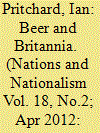

|
|
|
|
|
| Publication |
2012.
|
| Summary/Abstract |
Prior to industrialisation, there was a nebulous and fragmented Welsh national character or mass collective identity. Industrialisation engendered significant sociocultural upheaval and change, and for this 'new' society to function effectively a cohesive Welsh identity had to emerge. Because the impetus behind industrialisation had occurred primarily in a British context, any newly formed Welsh identity would ultimately have to be reconciled to the nation's industrial import within a 'United Kingdom'. Mass cultural commonalities and the role played by leisure in this procedure is a core element in the establishment of industrial modernist nation-states. Therefore, this article argues that public-house culture played a central role in the construction of a new industrial Welsh national ideology that was ultimately allied to, and a constituent of, a British imperial agenda designed to exploit both the natural resources and workforce of the area to its maximum extent.
|
|
|
|
|
|
|
|
|
|
|
|
|
|
|
|
| 5 |
ID:
165588
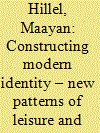

|
|
|
|
|
| Summary/Abstract |
This article explores the cultural transformation that unfolded in urban centres in Palestine during the British Mandate period. Focusing on the city of Haifa as a case study, the article sheds light on how imperial colonial interests prompted massive development of the city that triggered significant cultural changes. The article examines the ways in which different groups in Palestinian-Arab society were involved, and how they initiated, experienced and reacted to the cultural shifts. The rapid increase in the number of cafés, cabarets, bars and restaurants constituted the cornerstone of the commercial entertainment industry in Haifa during this period. By delineating the emergence of new entertainment patterns and recreation habits, the article shows how leisure became a central component in the daily lives of varied social groups. It argues that leisure played a major role as an agent of modernisation and functioned as an essential site for the construction of modern personhoods in Palestinian society.
|
|
|
|
|
|
|
|
|
|
|
|
|
|
|
|
| 6 |
ID:
189932
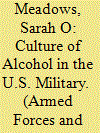

|
|
|
|
|
| Summary/Abstract |
Excessive alcohol use, especially binge and heavy drinking, represents a serious threat to force readiness across the Department of Defense. Though these behaviors are a matter of individual service member choice, they are influenced by perceptions of the culture of alcohol use in the military. This paper uses data from the 2018 Health Related Behaviors Survey of Active Duty service members to explore associations between perceived alcohol culture and excessive alcohol use, any serious drinking consequences, risky driving behaviors, productivity loss due to drinking, absenteeism, and presenteeism. Results from multivariate logistic regression reveal a strong, positive correlation between positive perceptions of drinking culture in the military and all outcomes. Targeting perceptions of the drinking culture is one way the military can reduce excessive and unhealthy use of alcohol and negative sequelae.
|
|
|
|
|
|
|
|
|
|
|
|
|
|
|
|
| 7 |
ID:
138781
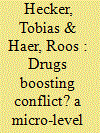

|
|
|
|
|
| Summary/Abstract |
Many studies have emphasized the role of natural resources in the onset and duration of armed conflict. Due to its characteristics, narcotics are considered to be one of the most influential resources. However, the dynamics of how this particular commodity is linked to conflict is still not well understood. Most scholars have focused on the revenue aspects of narcotics and only a few have mentioned the micro-level aspect, i.e., the effect of drug intake and alcohol consumption on combatants' behavior during conflict. With the help of a dataset based on 224 interviews held with former combatants in the Democratic Republic of the Congo, we examined this latter dynamic. Our analyses show, after controlling for armed group-level and individual-level variables, that drug intake and alcohol consumption boost the number of violent actions perpetrated by combatants.
|
|
|
|
|
|
|
|
|
|
|
|
|
|
|
|
| 8 |
ID:
105087
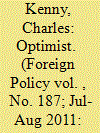

|
|
|
|
|
| Publication |
2011.
|
| Summary/Abstract |
The myth of the smug teetotaler is no joke. Many of the most popular theories of economic growth in wealthy countries, dating back to the Protestant work ethic of Max Weber, emphasize the abstemious and sober virtues of the well-to-do. And from the 18th-century Gin Acts in Britain to Prohibition in 1920s America to a certain class of modern-day economists, there's a long tradition of blaming intemperance for the persistence of poverty.
|
|
|
|
|
|
|
|
|
|
|
|
|
|
|
|
| 9 |
ID:
171305
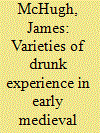

|
|
|
|
|
| Summary/Abstract |
Scholars of Indian cultural history have neglected the topic of alcohol and drinking, instead mostly emphasising a discourse of abstinence. Yet many Sanskrit technical and literary texts of the first through the early second millennium CE describe drinking in a positive light. There, drink is presented as a vital accessory for pleasure: drink is tasty, drink enhances the senses, loosens inhibitions and is associated with the enjoyment of sex for both women and men. The drinker is also an entertaining spectacle. Even those who abstained for religious reasons could savour the pleasures of drink as presented in poetry. Thus, within certain Sanskrit discourses that were presumably produced and used by an (unfortunately vaguely defined) educated elite through the later first and early second millennium CE, the multifaceted pleasures of drink are quite often celebrated. It is only by using a restricted archive that one would conclude that attitudes to drink among those who consumed Sanskrit texts in the early medieval period were largely negative.
|
|
|
|
|
|
|
|
|
|
|
|
|
|
|
|
|
|
|
|
|